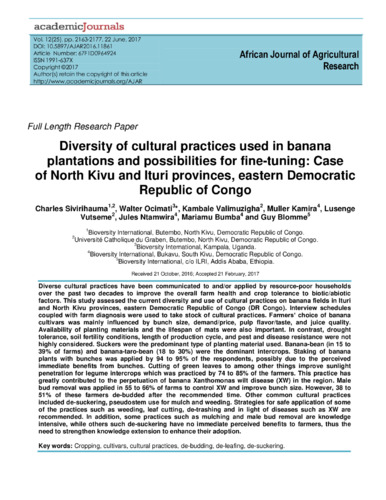Diversity of cultural practices used in banana plantations and possibilities for fine-tuning: Case of North Kivu and Ituri provinces, eastern Democratic Republic of Congo
Diverse cultural practices have been communicated to and/or applied by resource-poor households over the past two decades to improve the overall farm health and crop tolerance to biotic/abiotic factors. This study assessed the current diversity and use of cultural practices on banana fields in Ituri and North Kivu provinces, eastern Democratic Republic of Congo (DR Congo). Interview schedules coupled with farm diagnosis were used to take stock of cultural practices. Farmers’ choice of banana cultivars was mainly influenced by bunch size, demand/price, pulp flavor/taste, and juice quality. Availability of planting materials and the lifespan of mats were also important. In contrast, drought tolerance, soil fertility conditions, length of production cycle, and pest and disease resistance were not highly considered. Suckers were the predominant type of planting material used. Banana-bean (in 15 to 39% of farms) and banana-taro-bean (18 to 30%) were the dominant intercrops. Staking of banana plants with bunches was applied by 94 to 95% of the respondents, possibly due to the perceived immediate benefits from bunches. Cutting of green leaves to among other things improve sunlight penetration for legume intercrops which was practiced by 74 to 85% of the farmers. This practice has greatly contributed to the perpetuation of banana Xanthomonas wilt disease (XW) in the region. Male bud removal was applied in 55 to 66% of farms to control XW and improve bunch size. However, 38 to 51% of these farmers de-budded after the recommended time. Other common cultural practices included de-suckering, pseudostem use for mulch and weeding. Strategies for safe application of some of the practices such as weeding, leaf cutting, de-trashing and in light of diseases such as XW are recommended. In addition, some practices such as mulching and male bud removal are knowledge intensive, while others such de-suckering have no immediate perceived benefits to farmers, thus the need to strengthen knowledge extension to enhance their adoption.

